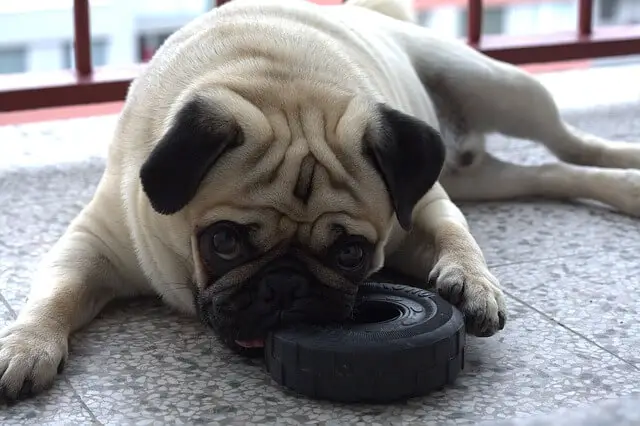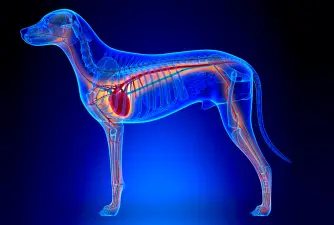Causes & Prognosis of Kidney Failure in Dogs
08.12.2021.
Like humans, dogs have kidneys that perform the same functions as our kidneys do. They are fantastic organs that will continue functioning until ⅔ of tissue is destroyed. Unfortunately, different conditions can cause kidney failure in dogs. If you’re worried about your dog’s health and you’d like to know more about this condition, keep on reading.
Why are kidneys important?
Before we go into too many details regarding kidney failure, we should learn why kidneys are important. Kidneys are your dog’s natural “filters” and regulators. They perform all sorts of functions in the body, and some of the most important ones are;
- Filtering waste from the blood
- Conserve water
- Produce urine
- Regulate essential minerals like calcium and potassium
What is kidney failure?
Most of us think that kidney failure refers to kidneys that have stopped working. If you’re not familiar with the term, that is the only logical conclusion. However, kidney failure doesn’t mean the kidneys stop working or can’t produce urine. Kidney failure means kidneys cannot filter the blood efficiently. The waste stays in the bloodstream, and it can cause all sorts of health issues. There are two types of kidney failure - acute and chronic.

Acute kidney failure
Acute kidney failure is usually associated with toxicities. Kidneys fail to perform their job rapidly, in a matter of hours. This form of kidney failure can also happen if the dog has an infection.
Chronic kidney failure
Kidneys have a “lifespan.” Unfortunately, over time, a dog’s kidneys will deteriorate. Some faster than others, and chronic kidney failure happens over long periods (months or years).
What causes kidney failure?
Kidneys are susceptible to different issues. Unfortunately, every disease that can affect kidneys can potentially cause kidney failure. Over time, the kidneys will lose their function, so it can also be age-related. Some of the most common kidney failure causes are;
- Congenital Disease - Dogs can be born without one or both kidneys, or they can develop improperly.
- Geriatric Deterioration - Over time, dogs’ kidneys lose their function and die.
- Toxicosis - If a dog ingests toxic things like antifreeze, raisins, or chocolate, the kidneys get poisoned and die.
- Bacterial infections - Dogs that get infected by drinking or swimming in contaminated water can get bacterial infections that cause renal cells to die off.
- Acute dehydration - Acute dehydration can cause acute kidney failure because there is not enough water in the dog’s body to keep the kidneys running smoothly.
- Dental disease - Dental disease should fall under bacterial infections because the bacteria will build up in the dog’s mouth and enter the dog’s bloodstream.

How can I know if my dog has kidney failure?
One of the main issues with kidneys is that they will keep working until more than ⅔ of their tissue is destroyed. That means the dog won’t show any clinical signs or symptoms of kidney failure until it is really dangerous. As dog owners, the best thing we can do is take our dogs to regular checkups and make sure they are as healthy as possible. The only way to know your dog has kidney failure is to get a diagnosis from your vet. You can learn kidney failure symptoms and get your dog examined as soon as possible.
Symptoms of kidney failure in dogs
If you notice something’s wrong with your dog, it would be best to call your vet and ask for an examination. However, if you learn the clinical signs of kidney failure, you might even make an educated guess regarding this condition. The most common symptoms of kidney failure in dogs are;
- Drinking and urination changes
- Depression
- Lethargy
- Weakness
- Loss of interest in playing, walking, or running
These are the most common symptoms of the first stages of kidney failure in dogs. Later stages will reveal more symptoms, and they are;
- Blood in urine
- Pale gums
- Mouth ulcers
- Lethargy
- Intestinal seizures
- Weightloss
- Incoordination
- Vomiting
- Chemical-smelling breath
- Loss of appetite
- Stumbling

How can vets diagnose it?
The sooner you get the diagnosis, the better. As soon as you bring your dog in for an examination, the vet will start looking at different signs of kidney issues. They will look at your dog’s medical history and see what issues your dog might be prone to. However, to completely confirm and diagnose kidney failure, the vet will examine your dog’s blood and urine. They will look for abnormalities that will point them in the right direction. Based on the dog’s symptoms, the vet will determine what stage of the disease your dog is in.
Is kidney failure in dogs treatable?
The first distinction we need to make is between acute and chronic kidney failure. Acute kidney failure happens abruptly, which usually points toward a health issue that might be resolved. Chronic kidney failure happens over time, and unfortunately, it is not treatable or curable. The only thing your vet can do is treat symptoms.
However, treatment can be successful if the issue is diagnosed early and the vets start treating it aggressively. In those cases, dogs can be responsive to treatment. The vet’s approach will come in two stages;
First stage treatment
The first stage of treating acute kidney failure is flushing the toxins. The vet needs to flush all the toxins out of your dog’s body, especially kidneys, and make sure they respond to it. If the condition progresses too far, the treatment might be ineffective.

Second stage treatment
The second stage of treatment will involve monitoring and preventing the progression of the condition. This will include a special renal diet, fluid therapy, phosphate binder therapy, therapy for protein in the urine, medications for regulating the parathyroid gland, calcium levels, and bone marrow stimulants that will force new red blood cell production.
What is the prognosis for dogs with kidney failure?
The exact prognosis will depend on the stage of the disease and the dog’s responsiveness to treatment. If the dog responds well and has acute kidney failure, they can live healthy, normal lives for years. Another thing that can heavily influence the way dogs handle acute kidney failure is their owner’s ability to perform follow-up care. You have to listen to your vet’s instructions and make sure you treat your dog diligently.
World Dog Finder team




![Senior Dog Food [2023 Review]](https://worlddogfinder.com/imager/334x225/upload/articles/senior_german_shepherd_eating_food.png)


Share